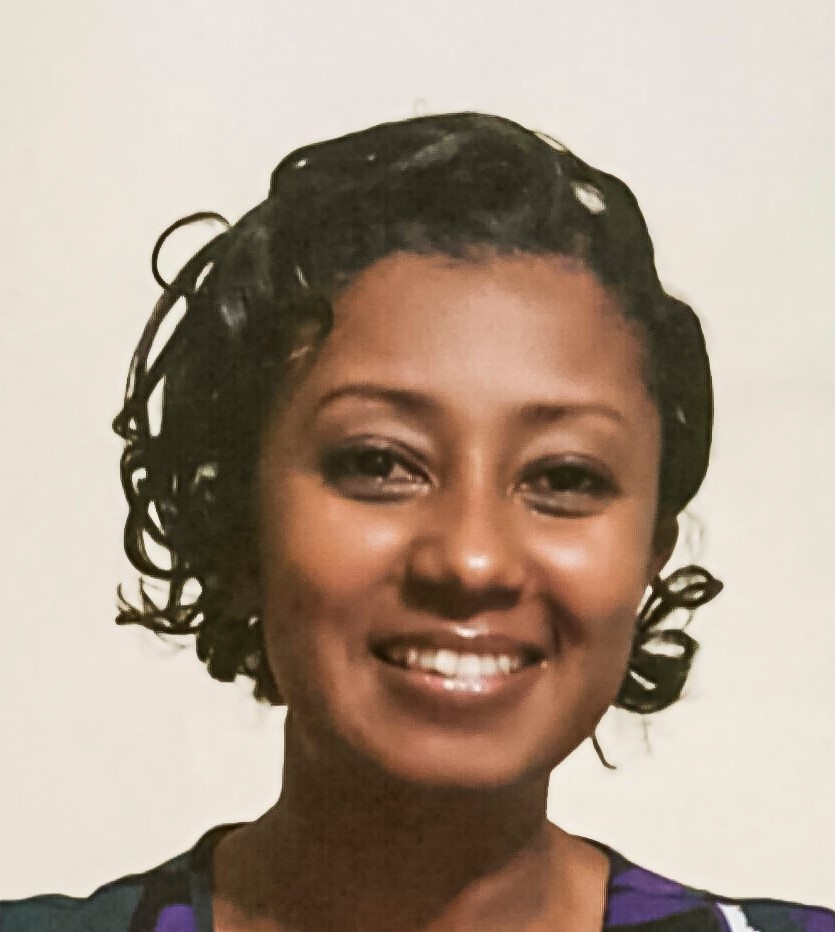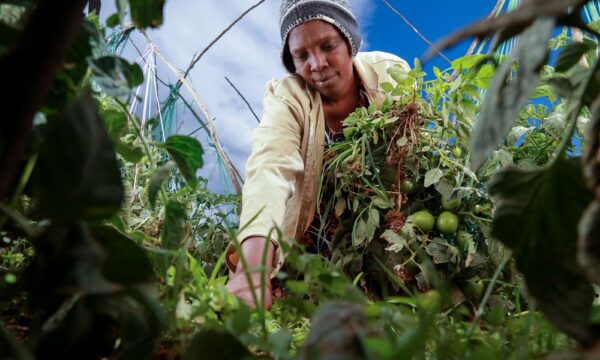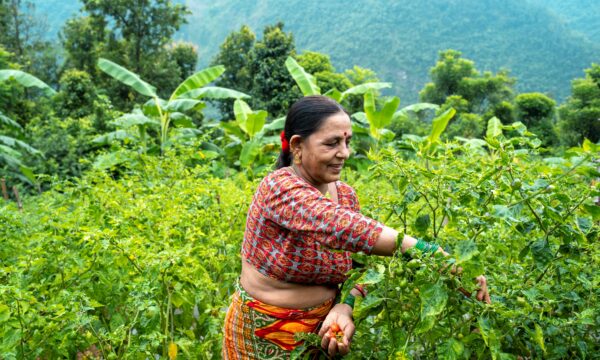CABI envisions a world in which women, youth, and marginalised communities are included and treated equally in agricultural production. In support of SDG5: Gender Equality, CABI is focused on empowering women in agriculture.
As such, this year we welcomed a key new member of staff, Bethel Terefe, as CABI’s first Gender Coordinator. Bethel will be leading our efforts to embed gender firmly across CABI, supporting gender mainstreaming by working with our scientists to ensure a gender lens is applied across all our work.

Bethel was born and raised in Ethiopia’s capital city, Addis Ababa. She hails from a social science background earning both her Bachelor’s and Master’s degree from Addis Ababa University. Her Master’s in Regional and Local Development Studies and her undergraduate study in Political Science and International Relations.
Since 2003, Bethel has worked in the development sector in Ethiopia with various international organizations, such as Oxfam, CARE, ActionAid, Water Aid, UNFPA and others on women’s empowerment and gender equality, water supply and sanitation, and agriculture water management programs. Her experience is mainly in gender programme design and implementation, policy engagement, networking and partnership development.
Here we get to know a little more about Bethel.
What motivated you to work in development?
I was motivated to work in the development sector because it gave me an opportunity to contribute positively to poverty reduction and improvement of people’s lives. I have always been passionate about equity and justice, and especially gender justice. Working in the development sector gave me an opportunity to advocate for and contribute in some small way for the realization of a world where men and women have equal opportunities to achieve their potential.
Have you faced any barriers in your career, how have you overcome them?
I have faced different hurdles in my career, which I think are also commonly shared with most people. The initial challenge was getting a job as a fresh graduate and then learning the skills you need to succeed in the world of work, which can be different from school. There were other challenges like specializing in a specific area, coming from a multi-disciplinary education background like I did, although that also has its own advantages. Others were challenges of working with bureaucratic government systems, when I was seconded in a government ministry and sometimes the challenges of working with partners.
What I have learned to be useful to overcome some of these challenges is being always open to learn, especially when you are in a new environment, asking for help without hesitation whenever you need it, and working with a team, collaborating and partnering with others. It’s also important to be persistent whenever you face challenges and to believe in yourself and in your abilities. And most importantly, selecting a field or an area of work you’re passionate about, will help you to work on it with energy and commitment.
What has been your biggest achievement so far?
I might not call it my biggest achievement as such, but one thing I’m pleased about is the changes I contributed to in my most recent job. I was working as a Gender and Inclusion Lead in a multi-donor funded, second phase of a five-years Civil Society Support Program, in Ethiopia. The programme aims to improve trust between government and civil society organizations (CSOs) towards the delivery of more responsive services to citizens, through grant, capacity building and engagement supports provided to CSOs. My role was supporting the programme to integrate gender in all its areas of work, something which the programme was criticized for not doing enough, during its first five-year phase. By the time I left the programme, Gender Transformation was made one key thematic area of the programme and gender and inclusion concepts were firmly integrated into the programme’s capacity building and grant work strands. It was also great to see some team members change into very strong gender equality advocates. It was a pleasure being part of that change and contributing to the change, which took place in the program.
What are you looking forward to most about working at CABI?
In CABI, I’m looking forward to working with a team of multi-disciplinary professionals in various countries doing important work that supports farmers livelihoods. I’m especially looking forward to the integration of gender in all aspects of the work that CABI does, so that both male and female farmers can benefit equally from the development interventions that CABI supports. I’m also looking forward to development of programmes that have a strong component of women’s empowerment and gender equity.
Why is gender mainstreaming in development work so important?
Mainstreaming gender in development work is important for various reasons. Development problems are differently experienced by men and women, because of existing gender differences, which dictate the kind of roles men and women have, and the opportunities and resources that they can access and control. For the same reason development interventions are likely to have different impacts on men and women. Therefore, if we don’t take these gender dynamics into account, the development interventions we design might not benefit men and women equally or they might even aggravate existing gender inequality. Failing to take account of existing gender dynamics in the design of development programmes can also reduce effectiveness in the realization of programme objectives. And most importantly, mainstreaming gender in development interventions is important because both men and women have equal rights to have their voices heard in development decision-making processes and to benefit from development outcomes. In short, mainstreaming gender in development work is both the smart thing and the right thing to do.
What are some of the biggest changes you’ve seen for women over the last 10 years?
One of the biggest changes I have seen in the past 10 years is the growing global recognition of the importance of gender equality and integration of gender in development work. The inclusion of a detailed gender equality goal – SDG5 – which covers issues ranging from unpaid care work, to land rights and political participation signifies a great commitment on the part of the international community, not to mention the integration of gender indicators in each of the other sustainable development goals. Gender equality gaps in education and health are closing, globally.
However, there are still wide gaps in economic participation, such as, ownership of financial assets, land, time spent on unpaid care work, as well as wide gaps in political participation. The pace of progress in closing the gender equality gap in some parts of the world is also very slow.
What are the biggest challenges facing women farmers right now?
Women farmers face interlinked challenges ranging from lack of: land ownership, access to financial services, technology, extension support, various inputs and markets. Underlying all these challenges are existing gender and social norms that perpetuate gender inequality. For example, women are not considered as farmers (since their work is not “paid”) and they tend to be overlooked in extension services that focus on male farmers.
Unpaid care work is considered solely as the responsibility of women, which constrains women farmers’ time and labour to work on their farms, to attend farmers trainings or meetings. Existing legal frameworks, in many countries, don’t recognize or implement women’s equal rights to land. As a result, most women don’t have land title in their names or jointly with their spouses. This creates challenges for them to borrow from financial institutions in order to purchase technology and various inputs for farming. Lack of land title also often prevents them from joining farmers cooperatives where they can access information, inputs and markets. Unpaid care work and gender norms also prevent women’s mobility to access markets or inputs.
Addressing those challenges will require changes in the formal and informal sphere both at individual farmers level and at system level. It would require building women farmers’ agency, raising their consciousness and awareness on their rights and providing access to various productive assets and opportunities at an individual farmer’s level. It also requires changing legal frameworks and institutional practices that don’t guarantee equal rights and opportunities to women farmers and shifting social norms that perpetuate existing gender inequality. Shifting social norms will also require engaging men and gate keepers of social norms, such as traditional and religious leaders.
Which women inspire you?
I’m inspired by women who have struggled for women rights and gender equality from different generations and across different cultures. Closer to home, I’m inspired by women rights activities in Ethiopia, whom I first encountered when I started working on gender equality issues. Among them are the Ethiopian Women Lawyers Association, who successfully influenced the revision of the national family law and criminal law in 2000 and 2005, to ensure protection of women’s equal rights by national laws, which were guaranteed by the constitution and international conventions Ethiopia ratified. I’m currently inspired by different gender equality activists I meet in different places in my work.
What advice would you give to women and girls thinking of pursuing a career in development?
If you’re passionate about development work, don’t hesitate to get into it. And like any other area of work, it requires being always open to learn. It requires commitment and being persistent in the face of challenges. You may not immediately see the results of your efforts or you might think what you’re doing is insignificant. But keep at it because, quoting Mahatma Gandhi, “whatever you do may seem insignificant to you, but it is most important that you do it.”
Find out more about CABI’s work in gender and youth
Also by Bethel Terefe: Social norms: why women farmers might not be getting ahead despite development support
1 Comment
Leave a Reply
Related News & Blogs
Forging a new approach to agriculture research from a gender lens
While working with women farmers across Africa for the past 17 years, Dr Lora Forsythe, lead of the Gender and Social Difference research group at the Natural Resources Institute, University of Greenwich in the United Kingdom, heard a common refrain “M…
16 April 2025





[…] “Gender mainstreaming is important because both men and women have equal rights to have their voic… […]